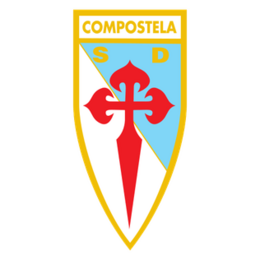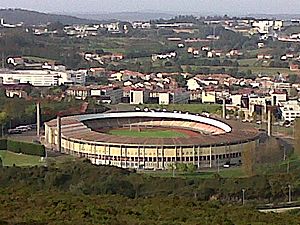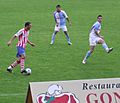SD Compostela facts for kids
 |
|||
| Full name | Sociedade Deportiva Compostela | ||
|---|---|---|---|
| Nickname(s) |
|
||
| Short name | Compostela; Compos | ||
| Founded | 1928; re-organised in 1962 and in 2004 |
||
| Stadium | San Lázaro, Santiago de Compostela, Galicia |
||
| Stadium capacity |
16,666 | ||
| Owner | Antonio Quinteiro (100%) | ||
| President | Antonio Quinteiro | ||
| Head coach | Rodri Veiga | ||
| League | Segunda Federación – Group 1 | ||
| 2022–23 | Segunda Federación – Group 1, 4th of 18 | ||
|
|
|||
Sociedade Deportiva Compostela is a Spanish football team. They are based in Santiago de Compostela, a city in Galicia. The team plays its home matches at the San Lázaro stadium. They are known by their nicknames Compos or Esedé.
Contents
History of SD Compostela
Early Years and Promotions
A football team called Compostela Foot-ball Club started in 1928. It stopped playing in 1946. Then, on June 26, 1962, a new team was formed. It was called Sociedad Recreativa Compostela. Later that year, on October 28, 1962, this new team joined with another club, Club Arenal. They changed their name to Sociedad Deportiva Compostela.
In the 1970s, the club started to move up in the football leagues. They played in the Tercera División and later in the new Segunda División B. Their first big step up was in 1977. They were promoted to Segunda División B (Group 1). They were promoted again in 1980 and stayed there for six years.
Challenges and Rise to La Liga
In 1986, the team faced problems both on and off the field. The president at the time, Francisco Steppe, resigned. This happened because of issues related to a game against Pontevedra CF. After this, the club worked hard to rebuild. By 1990, Compostela was back in the third-level league.
The 1990–91 season was a huge success for the club. On June 23, 1991, a crowd of 8,000 watched a play-off match. Goals from Juanito and Ochoa helped them win 3–1 against CD Badajoz. This victory meant they would play in the Segunda División for the first time ever.
The team moved to the Estadio Multiusos de San Lázaro stadium. This move happened as the team continued to do well. At the end of the 1993–94 season, Compostela won a play-off match against Rayo Vallecano 3–1. This amazing win meant they reached La Liga, Spain's top football league!
Compostela played very well in La Liga. Their best finish was 10th place in the 1995–96 season. This was thanks to their great strikers Christopher Ohen and Bent Christensen. Together, they scored 23 goals that season.
Decline and Reorganization
After four seasons in the top league, Compostela was relegated. They lost a play-off match to Villarreal CF in 1998. Even though they played good football, they went down to a lower league. This started a tough time for the club. They were relegated again in 2001.
The club faced serious money problems in the early 2000s. Players and staff sometimes did not get paid for months. In 2003, even though they finished ninth, they were relegated again. This was because they could not pay all their debts by a set deadline. They continued to struggle financially. In 2006, a judge officially closed down the club. All its belongings, including the team name and trophies, were sold.
A New Beginning
Before the original SD Compostela closed, a new club was formed on June 1, 2004. It was called SD Campus Stellae. This new team started playing in the 2005–06 season.
In 2006, a former president of the old SD Compostela, José María Caneda, bought the name Sociedad Deportiva Compostela. He became president of SD Campus Stellae. At the start of the 2007–08 season, he changed the team's name to the famous Sociedad Deportiva Compostela.
The new club quickly found success. In the 2007–08 season, they won their league and moved up to Tercera. The next season, they won their group again. They beat Atlético Monzón and earned another promotion. However, this return to higher leagues was short. They were relegated in 2010. More money problems led to another relegation. The longtime president, José María Caneda, then left the club.
SD Compostela has continued to play and compete in various Spanish football leagues since then. As of 2025, they are playing in the Segunda Federación.
Season Summaries
SD Compostela has had a long journey through Spanish football.
- 4 seasons in La Liga (Spain's top league)
- 7 seasons in Segunda División (second tier)
- 10 seasons in Segunda División B (third tier, now mostly replaced by other leagues)
- 16 seasons in Tercera División (third or fourth tier over time)
The re-organised SD Compostela (from 2005 onwards) has also had its own journey:
- 5 seasons in Segunda División B
- 4 seasons in Segunda Federación/Segunda División RFEF
- 6 seasons in Tercera División
- 1 season in Tercera Federación
Honours
- Tercera División: 2008–09, 2017–18, 2019–20
Current Squad
|
|
Famous Players
Here are some well-known players who have played for SD Compostela. This list includes players who played in at least 100 league games or played for their national teams.
 Adriano
Adriano Fabiano
Fabiano William
William Luboslav Penev
Luboslav Penev Bent Christensen
Bent Christensen Franck Passi
Franck Passi Stéphane Pignol
Stéphane Pignol Saïd Chiba
Saïd Chiba Peter Hoekstra
Peter Hoekstra Juan Viedma
Juan Viedma Christopher Ohen
Christopher Ohen Dmitri Popov
Dmitri Popov Dmitri Radchenko
Dmitri Radchenko Zoran Marić
Zoran Marić Goran Šaula
Goran Šaula Javier Bellido
Javier Bellido Manuel Castiñeiras
Manuel Castiñeiras Pichi Lucas
Pichi Lucas Nacho
Nacho Nando
Nando Pablo Pinillos
Pablo Pinillos Tomás Reñones
Tomás Reñones José Luis Veloso
José Luis Veloso Óscar Ferro
Óscar Ferro
Famous Managers
These are some of the well-known managers who have coached SD Compostela.
Stadium History

SD Compostela currently plays at the Estadio Multiusos de San Lázaro. This stadium can hold 16,666 people. The football pitch is 105 meters long and 68 meters wide.
When the club first started, Compostela played their first season at Estadio da Residencia da Universidade de Santiago de Compostela. This was while their first permanent home, Estadio Municipal de Santa Isabel, was being built. On September 22, 1963, they played their first match at the new Santa Isabel stadium. It was a simple stadium at first. A covered stand and floodlights were added in 1969. Compostela used this stadium for their main team until 1993. Their reserve team, Compostela B, played there until 2003. The stadium was then taken down and replaced with a sports center.
Work on the Multiusos de San Lázaro stadium began in 1991. It is located in the eastern part of San Lázaro. This stadium was built for many uses, but mainly for football matches. It was home to both Compostela and SD Ciudad de Santiago. The stadium is oval-shaped. It has a terracotta-colored roof on one side, where the directors' seats and press areas are. Around the football pitch, there is a 400-meter athletics track. This is not very common in Spanish stadiums.
The first match at the Multiusos de San Lázaro stadium was on June 24, 1993. It was a special tournament with four teams: Deportivo de La Coruña, CD Tenerife, Club Atlético River Plate, and São Paulo FC. Bebeto scored the very first goal in the stadium during the match between Deportivo and River.
Images for kids
-
Compostela playing against Lugo on 22 November 2009.
See also
 In Spanish: Sociedad Deportiva Compostela (2004) para niños
In Spanish: Sociedad Deportiva Compostela (2004) para niños
- 1995–96 La Liga, which was the best season in the club's history.
 | Toni Morrison |
 | Barack Obama |
 | Martin Luther King Jr. |
 | Ralph Bunche |


